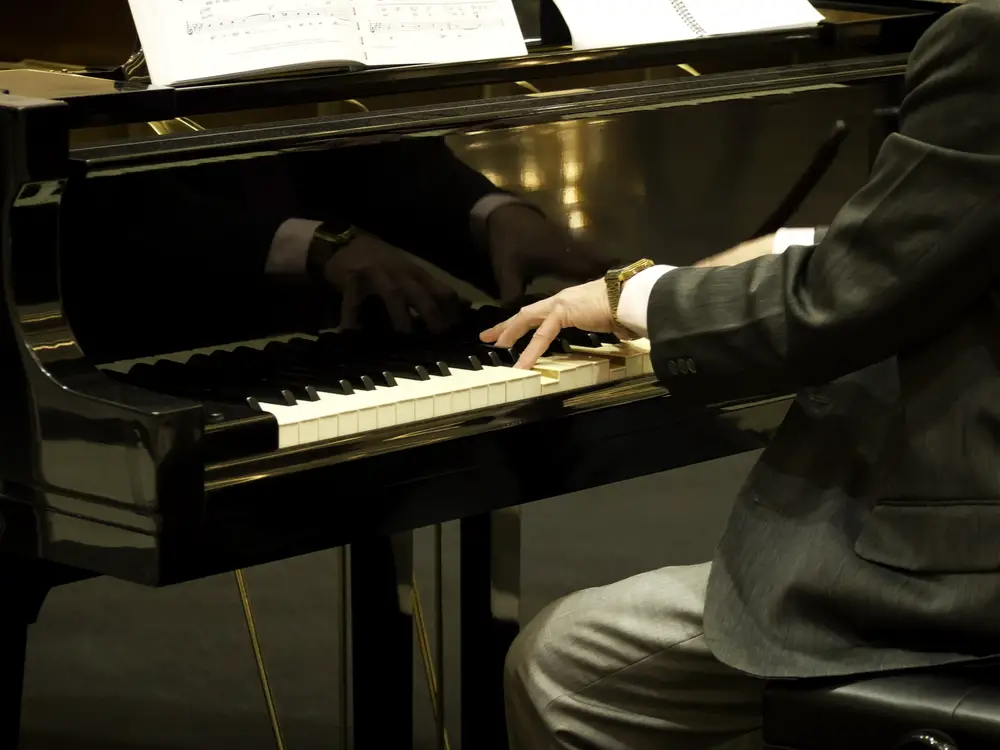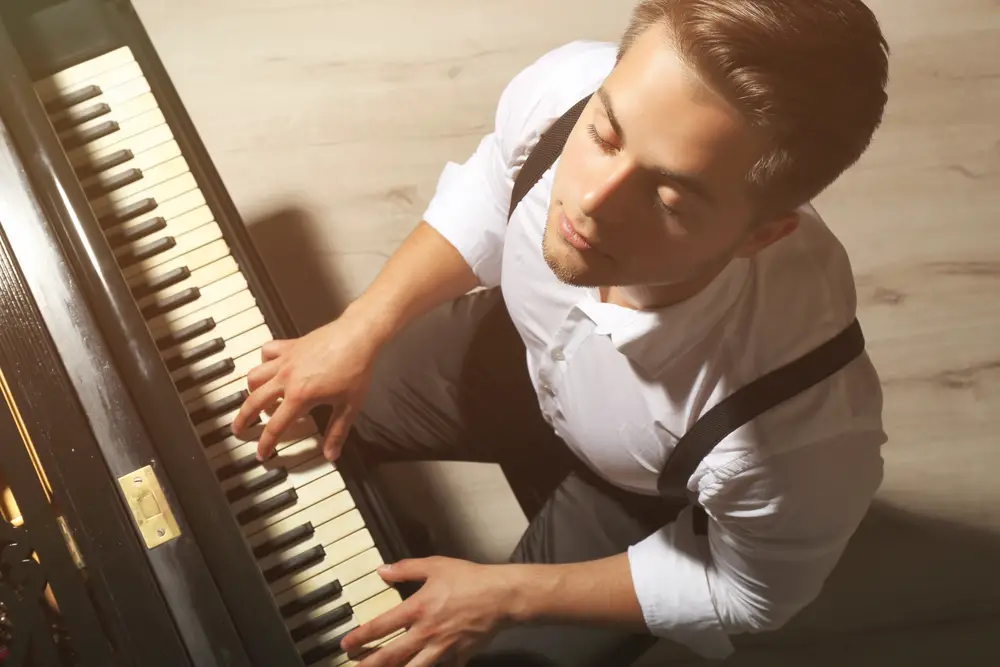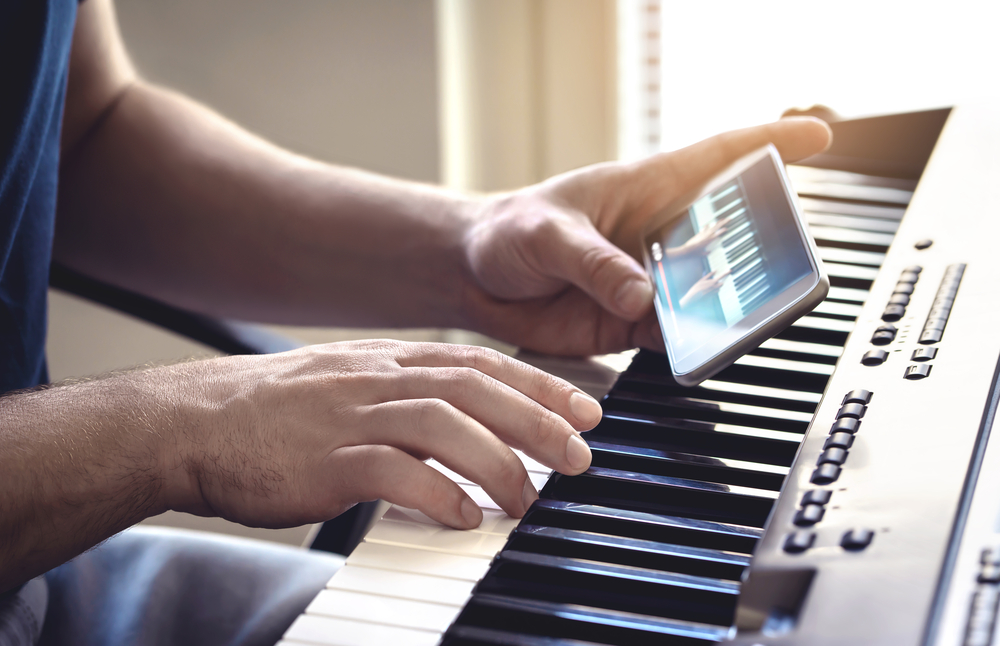
You can learn the piano in two ways: taking lessons or teaching yourself.
Both routes yield significantly different results.
It’s hard to find valuable information on this topic because some people push you to buy a product or service.
The truth is, both ways can work.
But, which one is better?
This article will go through the pros and cons of self-taught lessons versus teacher lessons.
Quick NavigationDifferences Between Self-Taught and Teacher-Taught PianistShort-Term DifferencesLong-Term DifferencesPros and Cons of Teacher LessonsPROSCONSPros and Cons of Teaching YourselfPROSCONSCan One Become an Accomplished Self-Taught Pianist?Famous Self-Taught PianistsThelonious MonkAlfred BrendelJoey AlexanderTips For Learning the Piano on Your Own
Differences Between Self-Taught and Teacher-Taught Pianist

Both learning paths are reasonable, but each one makes you a different pianist. Diving into the differences, we have to look at the long-term and short-term results.
Short-Term Differences
The biggest difference you’ll face is the learning material. If you take piano lessons, the teacher will create a learning plan for you. It’s best to look for a teacher that’ll create a personalized plan. Some of them might put you on the same plan as everyone else, which is bad. On the other hand, you might not create as detailed of a plan if you teach yourself. You may do a good job setting goals, but what will your plan be to reach those goals? Without professional advice, it’s more challenging to figure out the specifics.
However, it’s very possible to do if you’re motivated.
A teacher will have you learn scales and do exercises. It can be a bit easier to stay on track with nitty-gritty things with a teacher. However, everyone is different, and piano lessons might not be your cup of tea. The cold truth is, lots of people quit playing the piano after taking piano lessons. The idea of having to learn the piano can burn people out. To truly figure out which route is best, it’s vital to first understand your learning style.
If you teach yourself, you’ll have complete control over everything you practice. With this freedom, you’ll likely learn your favorite songs, which is great. The reason you want to learn the piano in the first place is probably for that reason.
You don’t have to worry about learning songs you won’t enjoy if you’re by yourself. However, freedom always comes with a cost. In this case, the cost is not knowing the exact steps to get better. There are endless online learning videos, tutorials, and sheet music. They don’t exactly make your life easier, though.
Have you ever stood at a vending machine, not knowing which snack to get? If so, you know that more choices don’t make it easier to choose. This concept applies to learning the piano by yourself. If you choose your snacks, or learning paths, wisely, you can have an excellent experience. People have even become world-class pianists without ever taking lessons. But, I’ll discuss them later in the article.
Long-Term Differences
Let’s look at the possible good and bad long-term differences. Taking piano lessons can lead to a massive improvement in time. A teacher will make sure your learning progression doesn’t have any holes or gaps. You can become an all-around pianist with excellent finger dexterity, musical knowledge, and technique. The possible unpleasant side of piano lessons is a decline in your interest and motivation. If you don’t enjoy the lessons, they can quickly suck away your enjoyment of playing the instrument.
Many good things can come from self-taught lessons in the long run. By always learning songs you enjoy, you’ll probably stay interested. You also won’t have to pay for lessons, which can be pretty expensive. On average, piano lessons cost $60 an hour and $30 per half hour. If you take 40 lessons a year at a $30 rate, that’s $1,200. You could buy another piano for that price. But what’s good about buying another one if you can’t play it? That leads me to the possible bad side of self-taught lessons in the long term.
One of the biggest pluses of teacher lessons is technique practice. If you’re on your own, you have to make it a priority to work on technique. Otherwise, you’ll never reach a high or even intermediate level. Even if you develop finger mobility, a poor technique will lead to arthritis. Many self-taught pianists don’t realize how important proper technique is.
Pros and Cons of Teacher Lessons

PROS
- Structured learning
- Focus on technique
- Weekly sheet music
- Resources and a plan are given to you
CONS
- Very expensive
- Not always effective
- Not always songs you enjoy
- Might be too slow or fast-paced
Pros and Cons of Teaching Yourself

PROS
- Freedom to learn what you want
- Access to endless online resources
- Free
- Easy to stay interested
CONS
- No guarantee you’ll learn the important things
- Easier to get distracted
- Long-term poor technique leads to no improvement and or injury
- Hard to choose which online resources to use
Can One Become an Accomplished Self-Taught Pianist?
It’s completely possible to become a well-rounded and accomplished pianist on your own. If you choose the right things to learn, the sky is the limit. Technically, there’s nothing you can’t learn on your own that you can learn with lessons. Learning on your own might even increase your motivation.
Along with practicing the basics, you can learn your favorite songs. Try to find a good balance between working on exercises, technique, and songs. If you focus too much on one of them, you’ll either lose motivation or never improve.
If you’re a visual learner, there’s never been a better time to learn the piano.
YouTube is filled with piano tutorials and other helpful videos. If you’ve watched some already, you’ve probably seen the type where animated notes fall to the keys, showing exactly which ones to play. These videos can be beneficial for visual learners. Even if you learn songs like this, it’s still important to learn sheet music. There will come a time when learning songs from videos becomes tedious. In the long run, being able to read sheet music will give you way more potential.
Famous Self-Taught Pianists
Thelonious Monk
One of the most famous self-taught pianists was Thelonious Monk. He started playing the piano at a young age and was largely self-taught. Besides his music, he was most known for his unusual playing style. Many people described it as percussive and harsh. Though his style was unconventional, he always seemed to play the right notes. He was posthumously awarded the Grammy Lifetime Achievement Award in 1993. Musicians agree that his musical influences forever changed jazz music.
Alfred Brendel
Alfred Brendel is one of the most renowned classical pianists of our time. Some people don’t know that he was mostly self-taught. He briefly took piano lessons but quit at the age of 16. After that, his piano playing endeavors started to flourish. He later claimed that he did much better without lessons, saying “A teacher can be too influential.” Brendel has received countless major musical awards throughout his career.
Joey Alexander
Another famous self-taught pianist is Joey Alexander. He’s the youngest on this list, but his story is worth mentioning. At 17 years old, he’s been nominated for 3 Grammys and has countless jazz awards under his belt.
Tips For Learning the Piano on Your Own
Learning the instrument can seem impossible if you don’t know where to start. It’s always best to start with the basics. What are the basics? Some of them include fingering, scales, and technique.
As I mentioned earlier, you can find lots of helpful online videos. However, you don’t need to focus completely on the basics. You’ll get the most enjoyment if you learn your favorite songs as well. When you develop some skills, it’s great to be content with them but not too content.
Though there are countless good online resources, it’s best to be a bit cautious. Only invest money in ones that go through the important aspects of playing.
The programs claiming you can be a piano master in one day are misleading. They cater to instant gratification but don’t follow through with their promises. Learning to play the piano takes consistent practice, no matter the person.
If you want to learn the fastest, create a plan for yourself, including learning songs, scales, exercises, sheet music, and chords. You’ll see the most musical growth by practicing at least 4 days per week. Those practice sessions don’t even need to be that long, either. If you know what you’re going to work on beforehand, you won’t need to practice for more than an hour. Creating a light, consistent, and healthy schedule will have you playing great in no time.
